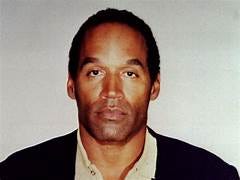I must have been the last guy on earth to believe that O. J. Simpson was innocent of murder.
As a football player, he played a big part in my family’s life. My dad, a popular and skillful executive for the Buffalo Bills, was instrumental in being sure the team signed him as the Number One draft pick out of USC in 1969.
People don’t remember, but Simpson’s first year on the team was a bust. He was used sparingly, despite all expectations. Hampered by injuries, his second year was no better. My dad spent many long nights away from home consoling him – not about his dwindling reputation as a halfback so much as how his failure to deliver was threatening his lucrative product endorsements.
At Simpson’s third season, all that changed. Dad had a big hand seeing that Lou Saban became head coach. That was the beginning of Simpson’s legendary NFL career. Juice. The Electric Company. The 2,000-yard season. The endorsements.
My recollection of Simpson, and my defensive attitude toward his accusers, was fed by two personal occurrences.
In the first instance, he visited the hospital room of my sister Mary, who was suffering from a series of afflictions that eventually killed her at age 16. He presented her with an autographed football. It made Mary very happy.
The other event that I remembered was when he agreed to be interviewed by me. I was a freelance writer with no credentials nor experience to show. Dad had by then died in 1973. An interview with the NFL superstar was a gracious act on his part. We talked amiably in the Bills’ locker room. As I recall, he was angling to land the role of Coalhouse Walker Jr. in the movie version of E. L. Doctorow’s “Ragtime.” He didn’t get it. And I didn’t publish the interview.
The rest of Simpson’s life story is well known. Instead of his being a story of how an incredibly skilled, charismatic athlete became a star in the movies or a memorable pitchman for corporate America, he became the notorious accused killer of two people. I’ll spare you a summary of his long, tawdry and discouraging life.
In the immediate wake of his arrest, I simply found it impossible to believe this man was a murderer. I remember the New York Times ran a typical “both-sides” follow-up to his arrest in which a friend called him a “bad cat.” The story ran with a dead-eyed mug of Simpson looking very, very bad.
Still, I refused to believe he was a killer.
Gradually, I saw evidence of callousness I could never have expected. He didn’t attend my father’s funeral but sent a telegram of condolence. He (or his people) answered an impassioned letter of support I wrote with a glossy, impersonal PR brochure. All before the trial that he was so lucky to survive.
These were little things, just as the events that colored my view of him before his first trial were little things. But as the trial progressed, no pity, no disbelief survived the evidence that was so ineptly delivered in Judge Ito’s court.
I’ve long since felt the botched burglary Simpson was subsequently convicted in 2008 of committing brought a sense of satisfaction. He did a couple years in prison. But his incarceration had by then stirred none of the outrage of his murder trial. By then, people had forgotten him and the chaos he brought to American life. He became old news. He was paroled nine years after his conviction and spent the rest of his days playing golf and signing autographs in Las Vegas.
The smart, handsome young man I thought I knew and defended did time for the wrong crime. Whatever good he may ever have done and whatever good he took from my dad’s dwindling days on earth have left an everlasting stain on a memory I once had, a memory of a man who I believed could do no wrong.




Completely forgot about this until yesterday ... a piece I wrote for the Philadelphia Inquirer back in 2016--and somehow retrieved from their archives: https://www.inquirer.com/philly/opinion/20160202_O_J__Simpson__the_Othello_of_our_times.html#loaded